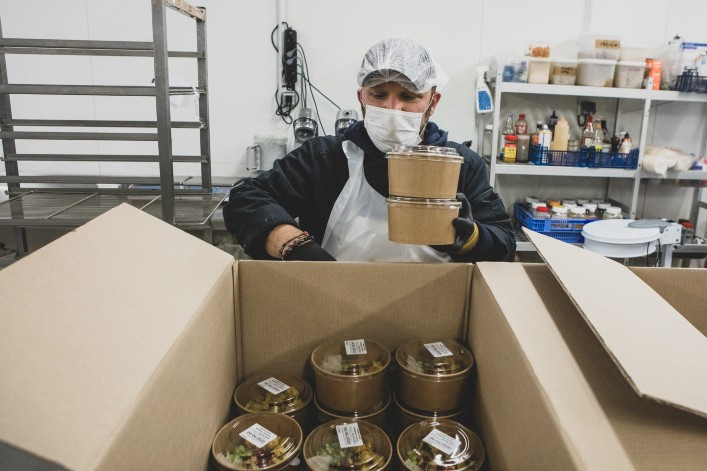“In no country of the world has the principle of association been more successfully used or applied to a greater multitude of objectives than in America.”
Alexis de Tocqueville, Democracy in America, 1835
By Anne Swardson
Tocqueville published those words a year after the French government under King Louis-Philippe had approved a repressive law broadening the penalties on associations of more than 20 people. In the modern day, his text is often cited to explain why charity in France is less robust and aid to the poor more government-centric than in the U.S.
That’s always been a tendentious theory. But there is no question that the four-plus weeks of France’s coronavirus lockdown have seen an explosion of voluntary, spontaneous charitable activity, both from existing aid groups and from new ones that have sprung up.
The above photo is from a group called La Communauté Ecotable (all links are to the donation pages), 20 or so young sustainable-restaurateurs across France who have banded together to make meals for hospital workers.

This is happening in other countries, of course, maybe even in bigger numbers. And there are plenty of longtime charitable organizations here, many of them working hard to feed and help people. Many of those have their roots in past disasters, such as the 2015 terrorist attacks. But the coronavirus has prompted an effort unprecedented in speed and breadth.
A coalition of 28 high-tech fablabs in France, for instance, has produced more than 7,500 visors for health and emergency workers. Another group is trying to make sure that senior homes, where more than 6,500 residents have died from COVID-19, get pots of muguets, lily of the field, on the May 1 holiday.
There are web sites where people can sign up to volunteer for any number of coronavirus-related activities: Calling and checking in on the elderly, teaching the handicapped, helping people with job skills and so on. Groups such as Association HOME, which counsels and shelters battered women, are seeking computers so that children can continue their schoolwork during the lockdown. In apartment buildings, people are posting notes offering to fetch groceries, watch children and the like. And mask-sewing clubs have sprung up across the country, some with thousands of members.
Certainly the need is great. While a system of labor and social protections means many workers are getting partial salaries or unemployment while they can’t work, that doesn’t help those who were already below the line or living at the margin. French President Emmanuel Macron Monday promised aid for the 3 million poorest families, but that money hasn’t started moving out the door. The police haven’t helped a lot either: In some cities, they have been giving tickets to homeless people – for not sheltering at home.
Volunteers at a large Catholic church near me, Sainte Odile, started giving out packed lunches in front of the church three weeks ago. They began by making 40 lunches a day, a harried volunteer told me. Now they are up to 160, and the food is gone by 12:15p.m. On a recent day the line stretched down the sidewalk, though everyone kept social distance.

Similarly, the American Cathedral in Paris, where I am a parishioner, gives out packed lunches every Friday. The volunteers also serve coffee, and I get the feeling that the guests enjoy the coffee and companionship as much as they do the lunch.

Even before the crisis, 35% of French people donated to nonprofit associations, and that number has no doubt grown. Again, much of this is happening elsewhere in the world. But it has a countercultural feel here. A man narrating a video he was shooting at the Sainte-Odile food distribution exclaimed in wonder: “And it’s not the government. It’s all volunteers!”
With the lockdown scheduled to end no sooner than May 11, and that only in stages, more of them will be badly needed.
Featured image photo credit: Mika Cotellon

Nice to see a photo of Francie. She never ages. Love to you all. I watch the American cathedral Easter service. Lovely.
Thanks, Anne. Interesting as always. In 1992 after a catastrophic flood in our village we tried to organize a kind of mini “United Way” relief effort to collect money, clothes, food or whatever. The reaction was a surprising “pas chez moi.” L’état c’est la Providence.